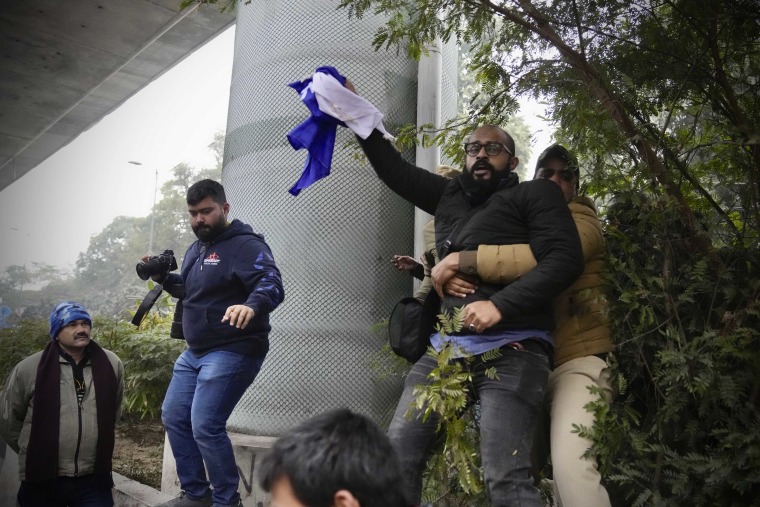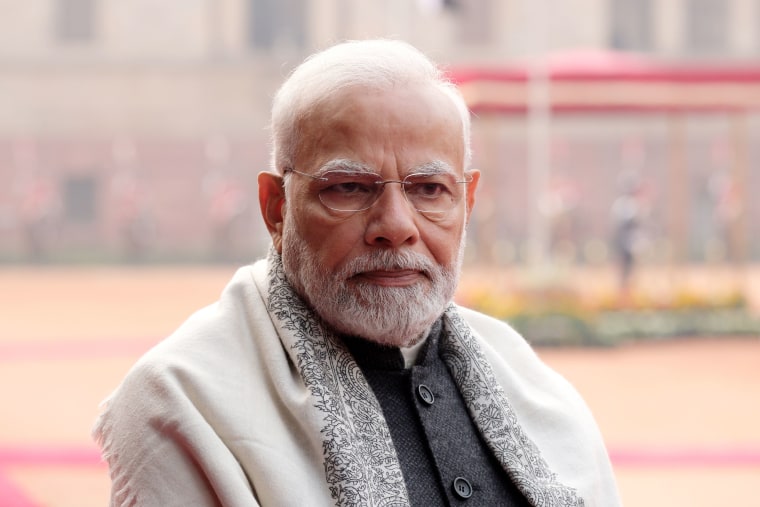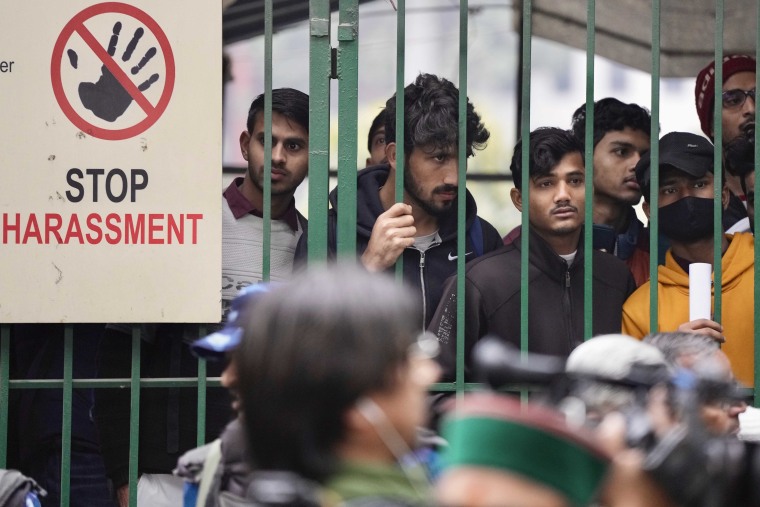[ad_1]
SRINAGAR, India — When the lights were suddenly cut off, the crowd of young people switched on the flashlights on their smartphones. They turned them toward the seat of a motorbike, where student activist Aishe Ghosh stood in defiance.
“They will shut one screen, we will open hundreds,” she shouted.
The students had gathered at Jawaharlal Nehru University in New Delhi, the Indian capital, for an outdoor screening of a new BBC documentary that is critical of Prime Minister Narendra Modi and his role in the deadly 2002 riots in Gujarat when he was the western state’s chief minister.
After the power outage — Ghosh blames the university administration, which hasn’t commented on it publicly — students streamed the film on their phones and laptops instead, either through VPNs or by sharing proxy links to archived footage via encrypted apps.
Authorities in India, the world’s largest democracy, have gone to extraordinary lengths to stop people inside the country from seeing the film since the first part aired in Britain last week, invoking emergency powers to order the removal of any clips or links that are posted on social media platforms including YouTube and Twitter. For Indians dismayed by what they see as rising authoritarianism under Modi and his Hindu nationalist Bharatiya Janata Party, watching the documentary has become a symbol of protest.

Many of India’s young people have no memory of the riots, in which more than 1,000 people, most of them Muslims, were killed. Modi denies being complicit in the attacks, and India’s Supreme Court upheld a ruling last year that he should be cleared of all charges.
Over half of India’s 1.4 billion people are under the age of 30, and they are shaping up to be a pivotal political force in the 2024 general election and beyond, Ghosh told NBC News.
“It is very important for the BJP to control these minds,” she said.
Arindam Bagchi, spokesperson for India’s Ministry of External Affairs, called the BBC film, “India: The Modi Question,” a “propaganda piece designed to push a particular discredited narrative” and said it reflected a “colonial mind-set.”
In a statement, the British broadcaster said that the film had been “rigorously researched” and that the Indian government had declined to comment on the allegations.
The first part of the documentary is about Modi’s political career before he became prime minister. Gujarat was convulsed by riots in early 2002 when Hindu mobs, blaming Muslims for the deaths of 59 Hindu pilgrims in a train fire, retaliated against Muslim communities.

According to the film, British officials said the violence bore “the hallmarks of ethnic cleansing” and that Modi, as chief minister, was “directly responsible” for letting it happen.
Harsh Mander, who quit his job as a civil servant to become a rights activist after the riots in Gujarat, said they “showed us a very different India than what we had promised ourselves at independence” in 1947.
“Today’s generation needs to see what happened in 2002 and make an informed choice,” he added. “Is this the India you want?”
For years, Modi was barred from traveling to the United States over his role in the riots, being invited back only after he became prime minister in 2014. The second half of the BBC documentary, which aired in Britain this week, focuses on his leadership since then.
Critics say Modi has promoted discrimination against India’s Muslim minority and quashed dissent, especially since his re-election in 2019. Some journalists have been stopped from traveling overseas, and government demands for the removal of content on Twitter have soared. Last year, India fell to 150th out of 180 countries on the World Press Freedom Index.
State Department spokesperson Ned Price said Wednesday that the U.S. supported press freedom and other rights that strengthen democracies.
“This is a point we make in our relationships around the world,” he said at a regular briefing. “It’s certainly a point we’ve made in India as well.”
Opposition lawmakers in India have also pushed back, sharing links to the documentary that have since stopped working.
“Sorry, Haven’t been elected to represent world’s largest democracy to accept censorship,” Mahua Moitra, a member of Parliament from the center-left All India Trinamool Congress, said on Twitter. “Here’s the link. Watch it while you can.”
But Kanchan Gupta, a senior adviser to India’s Ministry of Information and Broadcasting, called the film “anti-India garbage” and said YouTube and Twitter had complied with government orders to block it from being shared.

Both platforms have struggled with free speech issues in India. Twitter sued the Indian government last year over sweeping regulatory changes that give officials greater power to demand the removal of online content they deem threatening to the state, the same changes now being used to censor the BBC documentary. The future of the lawsuit is uncertain under the company’s new owner, Elon Musk.
“First I’ve heard,” Musk, who calls himself a free speech absolutist, said on Twitter this week when asked about the BBC film’s censorship in India. “It is not possible for me to fix every aspect of Twitter worldwide overnight, while still running Tesla and SpaceX, among other things.”
Kunal Majumder, the Indian representative of the Committee to Protect Journalists, said officials had weaponized an emergency provision of the laws, which are known as the Information Technology Rules, against legitimate journalism.
“The government has reacted to the documentary calling it propaganda and [part of a] colonial mind-set,” he said. “How does that qualify as an emergency?”
‘We created a plan’
Nivedya P.T., a student in New Delhi, was 2 years old at the time of the riots in Gujarat. She and others defied warnings from her university, Jamia Millia Islamia, not to screen the BBC film because “it is very important for us to know about our history,” she said.
“You cannot just block a documentary arbitrarily saying it is propaganda. That’s not right,” Nivedya said. “We have freedom of expression in this country, and we can watch any documentary and movie we want. So we created a plan.”
The screening was set for Wednesday night. That morning, Nivedya said, university staff chased her around campus and confiscated her phone. In the afternoon, she and three other students were taken away by police.
Students staged a protest near campus that night demanding Nivedya’s release, clashing with police officers equipped with tear gas and riot gear. Five students from the protest were detained as well, she said.
The campus remained closed the next day, students told NBC News, and police have maintained a strong presence in the area.
Nivedya’s detention came on the eve of Republic Day, a national holiday marking the anniversary of India officially adopting its Constitution, which guarantees freedom of expression.
“We are being deprived of our fundamental rights,” Nivedya lamented after she was released. “I’m not sure how democratic India is anymore.”
[ad_2]
Source link
